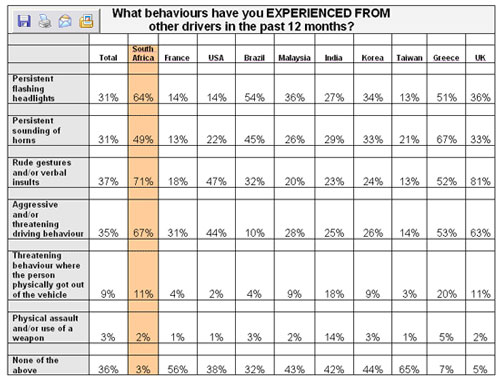Over 4,000 driving respondents in 10 markets were asked whether they have experienced various acts on the road ranging from the irritating - persistent honking of horns - to actual physical violence.
Synovate also asked respondents about their own aggressive driving behaviour, as well as the primary vehicle they drive.
The markets surveyed were South Africa, Greece, France, the US, Brazil, Malaysia, India, Korea, Taiwan and the UK.
Despite their diversity in terms of culture, level of economic development and even types of vehicles, all of these markets showed significant levels of aggression on the road. It is South Africa, however, that holds the unfortunate first place in this regard, with an overwhelming 67% of those interviewed reportedly experiencing some aggressive (85.1%) or threatening (11%) behaviour directed at them in the past 12 months. Hot on their heels was the UK, with Greece not far behind.
Perhaps reports of road rage incidences that have led to fatalities and murder charges have led to some caution, as South African motorists tend to demonstrate their aggression from within their vehicle, using rude gestures, flashing headlights and hooting to indicate their anger. Indeed, with the exception of Greece and India, most motorists prefer to stay within the (relative) safety of their vehicle.
Scott Miller, global CEO of Synovate Motoresearch, explains that this is all about our personal space, and invasion of this personal space is a serious step. "What's interesting is how few actually get out of the car to settle things on the spot," Miller points out. "It appears they are also only comfortable or brave enough to make those gestures from within that protected space."
Perhaps unsurprisingly given its anti-social context, admission to the respondents' own aggressive behaviours was far less forthcoming. However, SA again led the field, with 62% of those interviewed admitting that they had used aggressive behaviour on the road, from verbal insults right through to physical assault.
Albert McLean, Synovate's Chief Operating Officer for Middle East/Africa, cautioned that the higher rate of admissions could itself be cause for concern. McLean explained, "We may be witnessing indicators that aggression and road rage are becoming more acceptable social behaviour in South Africa. Acceptance of these behaviours will surely see an increase in aggression on our roads".
In terms of the context where aggressive behaviours occur, it seemed that rush hour was the time when South Africans generally behave poorly on the roads. Given the delays and stress on the roads this may seem inevitable, but this was not the case in most of the other markets. In the UK, Taiwan, France and the USA, aggression was more commonly reported when driving for leisure purposes or errands. In the UK, Taiwan and France, this is most likely owing to the use of public transport infrastructure, such as trains, buses and subway / underground trains, for the commute to work in these countries.
When asked to rate their behaviour as a driver, the respondents from SA tended more towards describing themselves as slow and cautious, rather than fast and reckless, although the majority rated themselves as midway between these two points. This did not differ significantly from most of the other markets surveyed.
The term 'road rage' has loosely defined all anti-social behaviour on the road, although Dr. Barry J. Elliott, an Australian research and communication psychologist, argues in a 1999 paper that it should only be confined to "intentional acts of violence and assault, and that the issue is a criminal matter, not a road safety concern."
McLean concluded by saying, "Given the reluctance of most South Africans to leave the safety of their vehicles, in this context, the incidence of road rage may be somewhat exaggerated. Nevertheless, South Africans are clearly extremely aggressive on the roads. Given the absence of an effective public transport system to deal with diverse demand and geographic spread of potential users, the pressure on South African roads during the morning and evening commute is unlikely to abate, and along with it, the resulting aggression."
